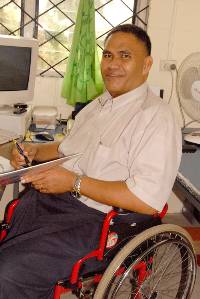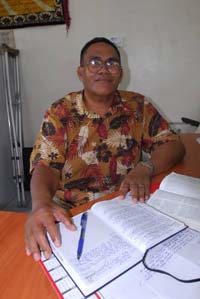From Fiji Times Online (25 July 2007)
Sumasafu believes in himself
by Maria Laqeta
 |
Sumasafu Vilsoni says self-belief got
him to where he is today |
FOR a man who was written off because of his physical disabilities at a young age, Sumasafu Vilsoni believes the only way for disabled people to achieve a normal life is to go through a normal education.
"My parents underestimated my ability," he candidly says.
"They doubted that one day I would have a family of my own because of my disability."
But a family he has managed quite well.
Today, he says he understands why there is so much pessimism among relatives of people who are physically challenged.
Mr Vilsoni was 15-years-old when he had his right leg amputated.
He remembers that day especially after falling from a coconut tree and fractured his right leg at Malhaha.
It became infected and the doctors had to amputate it.
Mr Vilsoni said when he started his own family in those early years he was under a lot of pressure.
The questions that he asked himself at that young stage in his life included how his family was going to survive with a disabled man?
"Where am I going to earn money from for my family," he used to ask himself.
He started to blame himself, God and his parents for his disability.
"The turning point in my life was when I received Christ.
"I began to understand that God allowed this to happen for His glory," Mr Vilsoni said.
"Your life is yours, so get up and do it yourself, no one else will come and do it for you," is his credo now.
Mr Vilsoni, 54, a former president of Fiji Sports for Disabled Association, is the founder and former member of the disabled movement. "Education for disability is very low in families, but we have to see their potential and tell people that this centre exists." Born and bred at Oinafa, on Rotuma, Mr Vilsoni was educated at Paptea District School from 1958 to 1964.
From there he went to Malhaha High School from 1965 to 1969 and then finished off his education at Ratu Sukuna Memorial School from 1970 to 1971.
From 1973 to 2004 he worked for Telecom Fiji as a financial administration officer.
From then onwards he was as lay pastor at Nasinu Wesley Church, serving in the church for two years before coming to the centre as its manager.
"I believe this is a mission from God that I should do for disabled people where I am a manager for the centre now," he said.
Mr Vilsoni is the youngest of eight siblings.
He was born to Hiagi and Olivia Vilsoni and brought up in the village. He is married to Kesaia Domonatagi and they have three children.
From 1989 to 1990 he was the Disabled People International vice president and in 1993 he became executive community member of the World Disabled People International as a representative of Asia and the Pacific region.
He is chairperson of the Pacific Disability Forum and in sports was a president of Fiji Sports for Disabled and represented Fiji to international sports meets.
The greatest challenge in life he experiences so far is the negative attitude of people watching his disability.
Vilsoni said the Fiji Vocational and Technical Training Centre for persons with Disabilities would host its first open day on July 27.
He said an entry fee of a saqamoli a head would be charged and schools from the Central Division were invited to attend.
From Fiji Times Online (29 January 2009)
Pushing on
By Geraldine Panapasa
 |
Sumasafu Vilsoni |
If you want to succeed in life, you have to believe in yourself says Sumasafu Vilisoni who has been an amputee for the past 41 years.
The 56-year old man from Oinafa was born and bred in Rotuma. He had his right leg amputated when he was 15 years old after falling off a coconut tree.
He is now the vice-president, finance, for the Fiji Paralympic Committee but has had a string of willful experiences in his life from winning a gold medal at an international games meet for the disabled and working for more than three decades at the Post and Telegraph department at the time.
Growing up in Rotuma was exciting and fun. The youngest in a family of eight siblings, Sumasafu wanted to be a teacher when he was younger.
Life in Oinafa was like any other village on the island. Farming and enjoying the plentiful natural resources on the island was an everyday norm.
"We had a couple of school teachers staying in the village with us and that was what I wanted to become when I was younger," he said.
"I was 15-years old when my right leg was amputated. This was late in the afternoon and the doctor had gone out fishing.
"When I went to the hospital, they called the doctor. I didn't go to school that day and tetanus injection was given to students at school that day.
"The doctor thought I had gone to school and got the injection so he didn't give me an injection."
The injury in his right knee became infected and spread above his knee. For a teenager still into adolescent life, Sumasafu said the idea of losing his leg was a shock.
He thought about how other people would react to him. He said life was hard for him at first from having an active life playing rugby with friends to walking with one leg and crutches.
"I didn't see any other amputee in the village to share and talk about what's going to happen after that," he said.
"People expressed their sympathy and I thought I was going to be dependent on my mum, dad and other people around me.
"But that didn't help me in life. My uncle was a church minister and from the time my leg was amputated, I didn't go to school.
"So my uncle asked me what I wanted to do. I told him to ask the principal to tell the students not to stare at me when I went back to school."
With constant encouragement from an American peace corp at Malhaha High in Rotuma, family and friends, Sumasafu was able to live life independently.
Adjusting to his new life, Sumasafu completed secondary school at Malhaha High and Ratu Sukuna Memorial in Nabua, Suva.
A passionate sports follower, Sumasafu would sneak to rugby games played by the school despite his disability.
"The teachers in Suva treated me like any other student. I really appreciated that and I found it encouraging," he said.
"I would walk from school to Raiwaqa just to show people that I could do what they were doing.
"From RSMS, I found a job as an accounts clerk at the Grand Pacific Hotel. The experience was challenging.
"I was torn between two cultures, from life on the island to the working environment. My parents were going back to Rotuma and I wanted to go see them off but my boss didn't allow that."
He went anyway to see his parents off because he didn't know when he would see them again. He got his marching orders the next day.
Sumasafu was able to find another job as a telegraphic officer at the Post and Telegraph Department.
He spent 33 years at the department retiring as the manager for supplies and purchasing.
In between work life, Sumasafu had a sideline passion - advocating for the rights of people with disabilities.
"The key in life is to keep pushing for greatness. If you want to move forward, it has to start from you.
"You have to have the confidence to keep pushing on with life despite your disability."
He is married with three children.





